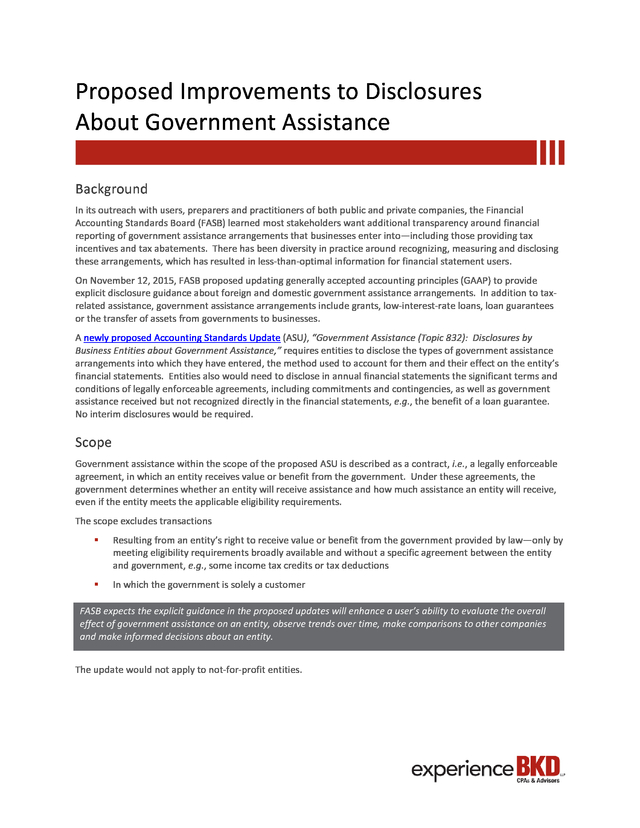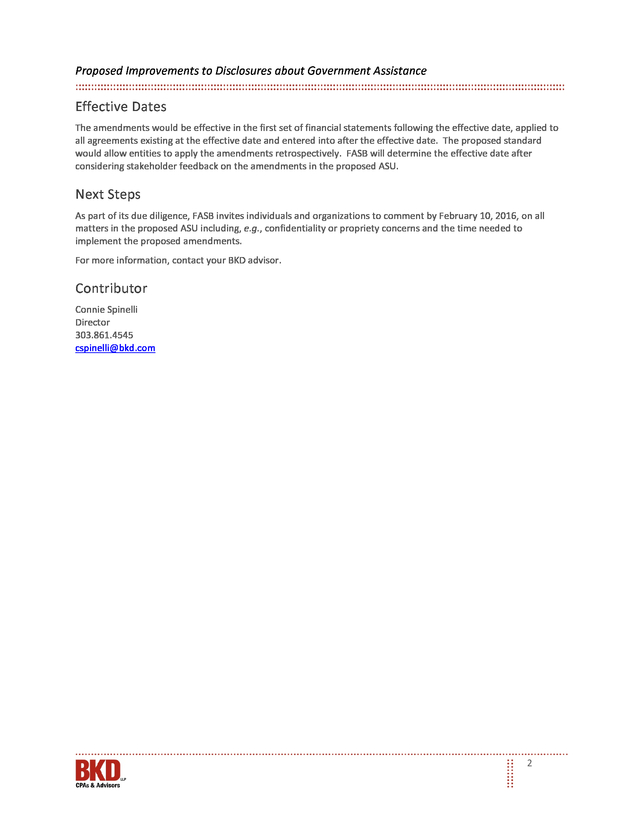Description
Proposed Improvements to Disclosures
About Government Assistance
Background
In its outreach with users, preparers and practitioners of both public and private companies, the Financial
Accounting Standards Board (FASB) learned most stakeholders want additional transparency around financial
reporting of government assistance arrangements that businesses enter into—including those providing tax
incentives and tax abatements. There has been diversity in practice around recognizing, measuring and disclosing
these arrangements, which has resulted in less-than-optimal information for financial statement users.
On November 12, 2015, FASB proposed updating generally accepted accounting principles (GAAP) to provide
explicit disclosure guidance about foreign and domestic government assistance arrangements. In addition to taxrelated assistance, government assistance arrangements include grants, low-interest-rate loans, loan guarantees
or the transfer of assets from governments to businesses.
A newly proposed Accounting Standards Update (ASU), “Government Assistance (Topic 832): Disclosures by
Business Entities about Government Assistance,” requires entities to disclose the types of government assistance
arrangements into which they have entered, the method used to account for them and their effect on the entity’s
financial statements. Entities also would need to disclose in annual financial statements the significant terms and
conditions of legally enforceable agreements, including commitments and contingencies, as well as government
assistance received but not recognized directly in the financial statements, e.g., the benefit of a loan guarantee.
No interim disclosures would be required.
Scope
Government assistance within the scope of the proposed ASU is described as a contract, i.e., a legally enforceable
agreement, in which an entity receives value or benefit from the government.
Under these agreements, the government determines whether an entity will receive assistance and how much assistance an entity will receive, even if the entity meets the applicable eligibility requirements. The scope excludes transactions  Resulting from an entity’s right to receive value or benefit from the government provided by law—only by meeting eligibility requirements broadly available and without a specific agreement between the entity and government, e.g., some income tax credits or tax deductions  In which the government is solely a customer FASB expects the explicit guidance in the proposed updates will enhance a user’s ability to evaluate the overall effect of government assistance on an entity, observe trends over time, make comparisons to other companies and make informed decisions about an entity. The update would not apply to not-for-profit entities. . Proposed Improvements to Disclosures about Government Assistance Effective Dates The amendments would be effective in the first set of financial statements following the effective date, applied to all agreements existing at the effective date and entered into after the effective date. The proposed standard would allow entities to apply the amendments retrospectively. FASB will determine the effective date after considering stakeholder feedback on the amendments in the proposed ASU. Next Steps As part of its due diligence, FASB invites individuals and organizations to comment by February 10, 2016, on all matters in the proposed ASU including, e.g., confidentiality or propriety concerns and the time needed to implement the proposed amendments. For more information, contact your BKD advisor. Contributor Connie Spinelli Director 303.861.4545 cspinelli@bkd.com 2 .
Under these agreements, the government determines whether an entity will receive assistance and how much assistance an entity will receive, even if the entity meets the applicable eligibility requirements. The scope excludes transactions  Resulting from an entity’s right to receive value or benefit from the government provided by law—only by meeting eligibility requirements broadly available and without a specific agreement between the entity and government, e.g., some income tax credits or tax deductions  In which the government is solely a customer FASB expects the explicit guidance in the proposed updates will enhance a user’s ability to evaluate the overall effect of government assistance on an entity, observe trends over time, make comparisons to other companies and make informed decisions about an entity. The update would not apply to not-for-profit entities. . Proposed Improvements to Disclosures about Government Assistance Effective Dates The amendments would be effective in the first set of financial statements following the effective date, applied to all agreements existing at the effective date and entered into after the effective date. The proposed standard would allow entities to apply the amendments retrospectively. FASB will determine the effective date after considering stakeholder feedback on the amendments in the proposed ASU. Next Steps As part of its due diligence, FASB invites individuals and organizations to comment by February 10, 2016, on all matters in the proposed ASU including, e.g., confidentiality or propriety concerns and the time needed to implement the proposed amendments. For more information, contact your BKD advisor. Contributor Connie Spinelli Director 303.861.4545 cspinelli@bkd.com 2 .













